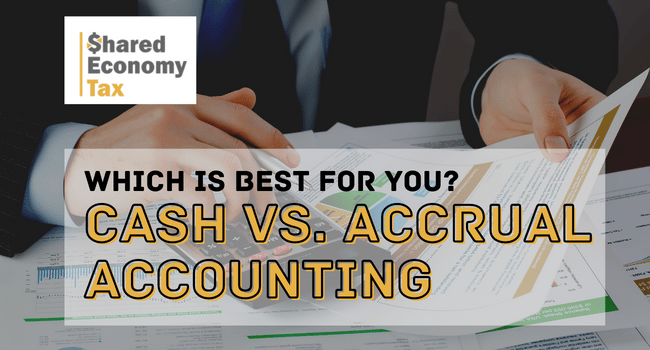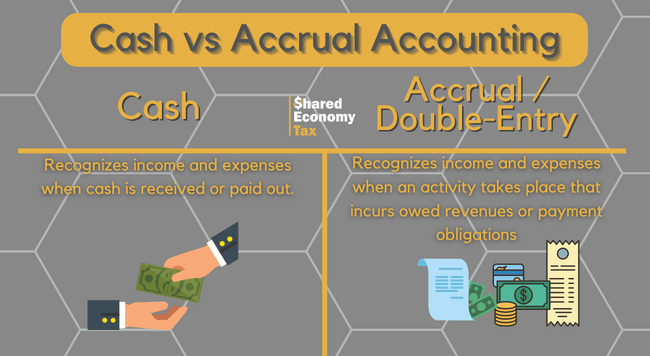What’s cash vs accrual accounting? The cash basis of accounting is simple – you record your revenue as your deposit it in the bank and expenses when you make a purchase. The accrual basis instead determines revenue and expenses based on when they earn. We’ll explore the differences between the two methods and when each type is appropriate.
What Is the Basic Difference Between Cash vs. Accrual Accounting?
The fundamental difference between cash vs accrual accounting is the timing of revenue and expenses.
Cash Basis Accounting
Cash basis accounting is the more straightforward way to keep your books and is used by most small businesses.
In cash basis accounting, income is recorded on the books when it is received. So, for example, if a customer hands you money or you receive a check from a client, that immediately counts in your revenue.
When you write the check for the expense or submit an electronic payment, expenses are a part of your profit and loss. You can also record expenses paid by credit card even if you have not yet paid your credit card bill.
Cash basis accounting makes it easy to recreate your books if you do after-the-fact accounting. This is because you can complete your accounting using the bank, credit card, and loan statements.
Accrual Basis Accounting
Accrual accounting is more complicated and requires constantly being on top of your books.
Recording revenue on your books when it’s earned is the accrual basis of accounting. For example, suppose you accept a customer deposit for work delivered you will complete next month. In that case, the deposit stays in a liability account and not a part of your revenue until next month. Conversely, if you complete work for a client today and send an invoice, the invoiced amount is automatically a part of your income today, even if your client doesn’t pay you until six months from now.
You can record your expenses when they incur. For example, if you write a single check for this month’s rent and next month’s rent, only this month’s rent would be considered an expense this month.
Accrual accounting requires recording invoices as you receive them and keeping your books up-to-date throughout the year.
The accrual method is the more common accounting method, and larger businesses require it.
Cash Basis Accounting
When choosing which method of accounting to use, you should consider the advantages and disadvantages of the cash basis of accounting.
The cash basis of accounting is easy to implement. You don’t need to record invoices for your revenue or enter bills as you receive them. Instead, you only need to record the inflows and outflows that happen today. You can also recreate your books at the end of the year from statements.
Cash basis accounting does have drawbacks. You only have a limited picture of your income and expenses. It’s also difficult to match up your income and expenses. If you need monthly profit and loss statements, they’ll show considerable variation each month based on when you make deposits or pay your bills.
Cash basis accounting is not allowable for certain businesses. For example, you cannot use cash basis accounting if you sell products or services on credit, maintain an inventory, or have more than $25 million in gross receipts.
If your business grows and exceeds the $25 million limit to use cash basis accounting, it complicates things to change to the accrual method.
Accrual Basis Accounting
Accrual basis is a more robust accounting method that gives you a fuller picture of your company’s net income.
An accrual basis is more helpful in completing business analysis because it matches the company’s revenue and expenses. In addition, investors prefer accrual accounting because it’s less subjective. This is because the books don’t rely on which days you go to the bank or write checks. Additionally, the accrual basis complies with GAAP, whereas the cash basis does not meet the required standards.
Accrual accounting is not without disadvantages. Because invoices and accruals are recorded on the books, it requires calculations and can be harder to verify the legitimacy of income and expenses. It is also possible that using the accrual basis of accounting will lead to a company paying taxes on income it has not yet received. This could become a significant problem if the company has a large account receivable balance.
Accrual accounting requires an accounting staff that thoroughly understands how to record accruals, which most small businesses do not have.
How Do You Choose Cash Basis vs. Accrual Basis Accounting?
If you’re wondering which method of accounting (cash vs accrual accounting) is the right one for your business, there are several factors you should consider.
How Complex is Your Business?
The more complex your business is, the more likely you need to use the accrual method of accounting. Cash basis accounting makes it difficult to see how your business performs since your income and expenses are not necessarily aligned.
What are Your Annual Revenues?
If you meet the IRS threshold of $25 million in average revenue of the previous three years, you must use the accrual basis of accounting. If you suspect that your business will meet this figure in the future, it may be wise to use the accrual basis now to avoid the hassle of switching later.
Is Your Company Public or Private?
Generally Accepted Accounting Principles, or GAAP, mandate that publicly-listed companies must use the accrual accounting method, so PubCos have no choice when it comes to their accounting method. Private companies can choose either method, but the size of your business will likely dictate the best choice.
Resources and Tax Implications
Also, consider whether you have the staff available to wholly and accurately record your books on an accrual basis each month. Finally, you should also consider the tax implications of a large account receivable balance. This is because you do not want to run into a situation where you pay taxes on unreceived revenue.
Cash vs. Accrual Accounting: Closing Thoughts
The cash basis of accounting is a more straightforward way of accounting for your business transactions. It’s the method that most small businesses use. However, if you want to track your profits and losses over time, and especially if you want to attract investors or take out a loan, you will need to use the accrual basis of accounting.
Offload Your Bookkeeping and Focus on Business
The tax experts at Shared Economy Tax can take the time-consuming task of bookkeeping off your plate. Set up a chat with one of our tax pros today to see how much time and money you can save with Shared Economy Tax.

